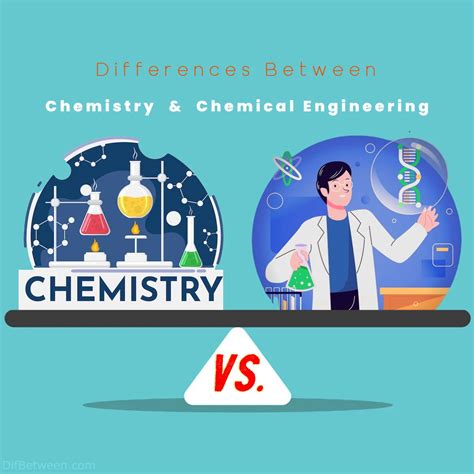Introduction
In the realm of science and technology, chemistry and chemical engineering often overlap but remain distinct fields. While both disciplines deal with the properties and transformations of matter, they differ significantly in their objectives and methodologies. This article will explore the differences between chemistry and chemical engineering, highlighting their key distinctions and potential career paths.

Chemistry: The Study of Matter
Chemistry delves into the fundamental properties of matter at the atomic and molecular level. It encompasses the study of chemical reactions, bonding, spectroscopy, and the behavior of substances under various conditions. Chemists seek to understand the composition, structure, and reactivity of chemical compounds. They utilize experimental techniques, computational models, and theoretical frameworks to analyze and interpret the behavior of matter.
Chemical Engineering: The Application of Chemistry
Chemical engineering focuses on the practical application of chemical principles to design, operate, and optimize processes that transform raw materials into valuable products. Chemical engineers bridge the gap between chemistry and industry by developing and implementing technologies for large-scale chemical conversions. They apply their knowledge to areas such as process design, reactor analysis, heat transfer, fluid flow, and safety control.
Key Differences
While chemistry and chemical engineering are interconnected, they have distinct characteristics:
Objectives
- Chemistry: To understand the fundamental nature of matter and its interactions.
- Chemical Engineering: To design and operate processes that convert raw materials into useful products efficiently and safely.
Focus
- Chemistry: Molecular and atomic properties, bonding, reactions, and spectroscopy.
- Chemical Engineering: Process design, scale-up, optimization, and control.
Methods
- Chemistry: Experiments, modeling, simulations, and theoretical analysis.
- Chemical Engineering: Process modeling, data analysis, design optimization, and plant operation.
Career Paths
Both chemistry and chemical engineering offer diverse career opportunities in various industries:
Chemistry
- Research Scientist (Universities and Research Institutions)
- Analytical Chemist (Industrial Laboratories and Quality Control)
- Synthetic Chemist (Pharmaceuticals and Chemical Manufacturing)
- Environmental Chemist (Water and Air Quality Analysis)
- Forensic Scientist (Law Enforcement and Crime Scene Investigation)
Chemical Engineering
- Process Engineer (Pharmaceuticals, Petrochemicals, Food Processing)
- Product Development Engineer (Chemicals and Materials)
- Plant Manager (Manufacturing and Production)
- Safety Engineer (Regulatory Compliance and Risk Management)
- Technical Sales Engineer (Equipment and Process Optimization)
Benefits of Combining Chemistry and Chemical Engineering
Integrating knowledge from both fields can provide a competitive advantage in the industry:
- Enhanced understanding of chemical reactions and process behavior
- Ability to design and troubleshoot processes effectively
- Improved safety and sustainability in industrial operations
- Development of innovative products and technologies
Common Mistakes to Avoid
- Confusing chemistry with chemical engineering: While related, the two fields have distinct objectives and methodologies.
- Assuming chemistry is only a laboratory science: Chemistry has broad applications in industry, medicine, and environmental science.
- Thinking chemical engineers are not scientists: Chemical engineers apply scientific principles to solve real-world problems.
- Overlooking the importance of interdisciplinary collaboration: Chemistry and chemical engineering complement each other in many applications.
How to Choose the Right Field
Consider the following factors when choosing between chemistry and chemical engineering:
- Interests: Do you enjoy investigating the fundamental properties of matter or designing and operating processes?
- Career goals: Do you prefer a research-oriented career or a career in industry?
- Skills: Do you have strong problem-solving, analytical, and communication skills?
- Education and training: Chemistry requires a strong foundation in science, while chemical engineering typically involves a bachelor’s or master’s degree in the field.
FAQs
1. Is chemistry harder than chemical engineering?
The difficulty of each field depends on individual strengths and interests. However, chemical engineering typically involves more mathematics and engineering principles.
2. Which field offers higher salaries?
Both chemistry and chemical engineering can offer lucrative careers, with chemical engineers generally earning higher salaries due to their specialized skills and responsibilities.
3. Can I switch between chemistry and chemical engineering?
It is possible to transition between the two fields, but it may require additional education or training to bridge the knowledge gap.
4. What are emerging trends in chemistry and chemical engineering?
Nanotechnology, green chemistry, and energy storage are areas of growing interest for both disciplines.
5. What is the job outlook for chemistry and chemical engineering?
The job outlook for both chemistry and chemical engineering is expected to be positive, driven by advancements in technology and healthcare.
6. How can I prepare for a career in chemistry or chemical engineering?
Engage in STEM activities, participate in internships, and pursue higher education in the respective field.
Tables
1. Career Options in Chemistry and Chemical Engineering
| Field | Careers |
|---|---|
| Chemistry | Research Scientist, Analytical Chemist, Synthetic Chemist, Environmental Chemist, Forensic Scientist |
| Chemical Engineering | Process Engineer, Product Development Engineer, Plant Manager, Safety Engineer, Technical Sales Engineer |
2. Differences in Focus and Objectives
| Field | Focus | Objectives |
|---|---|---|
| Chemistry | Molecular and atomic properties, bonding, reactions, spectroscopy | Understanding the fundamental nature of matter |
| Chemical Engineering | Process design, scale-up, optimization, control | Designing and operating processes to convert raw materials into useful products |
3. Educational Requirements for Chemistry and Chemical Engineering
| Field | Degree | Typical Coursework |
|---|---|---|
| Chemistry | Bachelor’s/Master’s in Chemistry | General Chemistry, Organic Chemistry, Analytical Chemistry, Physical Chemistry |
| Chemical Engineering | Bachelor’s/Master’s in Chemical Engineering | Process Design, Fluid Dynamics, Heat Transfer, Thermodynamics, Reactor Analysis |
4. Median Annual Salaries for Chemistry and Chemical Engineering
| Field | Median Annual Salary (2021) |
|---|---|
| Chemistry | $74,610 |
| Chemical Engineering | $108,380 |
Conclusion
Chemistry and chemical engineering complement each other, enabling the development of innovative technologies and products that shape modern society. Understanding the differences between these fields can help individuals make informed career choices and contribute to advancements in science and industry. By combining the fundamental knowledge of chemistry with the practical applications of chemical engineering, we unlock the potential for transformative solutions and sustainable progress.
